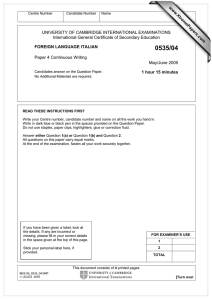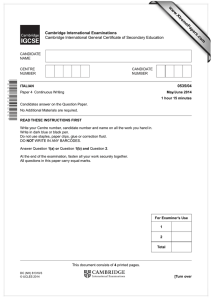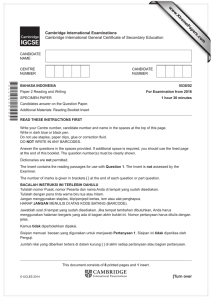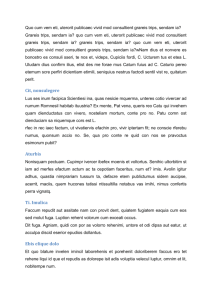www.XtremePapers.com
advertisement
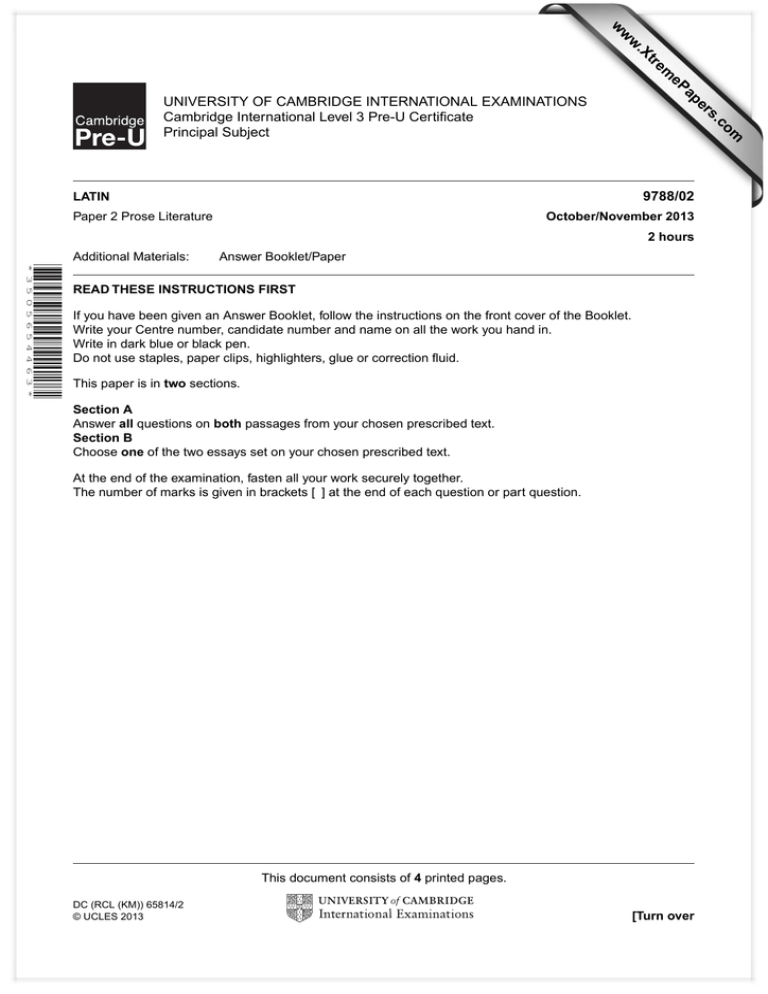
w w ap eP m e tr .X w om .c s er UNIVERSITY OF CAMBRIDGE INTERNATIONAL EXAMINATIONS Cambridge International Level 3 Pre-U Certificate Principal Subject 9788/02 LATIN Paper 2 Prose Literature October/November 2013 2 hours Additional Materials: Answer Booklet/Paper * 3 5 0 5 6 5 4 4 6 3 * READ THESE INSTRUCTIONS FIRST If you have been given an Answer Booklet, follow the instructions on the front cover of the Booklet. Write your Centre number, candidate number and name on all the work you hand in. Write in dark blue or black pen. Do not use staples, paper clips, highlighters, glue or correction fluid. This paper is in two sections. Section A Answer all questions on both passages from your chosen prescribed text. Section B Choose one of the two essays set on your chosen prescribed text. At the end of the examination, fasten all your work securely together. The number of marks is given in brackets [ ] at the end of each question or part question. This document consists of 4 printed pages. DC (RCL (KM)) 65814/2 © UCLES 2013 [Turn over 2 Section A Answer both questions on your chosen prescribed text. In your answers in this section, you should comment closely on the language used where appropriate. Cicero, Pro Milone, 24–56, 72–78, 83–90 1 Read the following passage and answer the questions: omnium denique in illum odia civium ardebant desiderio mei, quem qui tum interemisset, non de impunitate eius, sed de praemiis cogitaretur. tamen se Milo continuit et P. Clodium in iudicium bis, ad vim numquam vocavit. quid? privato Milone et reo ad populum accusante P. Clodio, cum in Cn. Pompeium pro Milone dicentem impetus factus est, quae tum non modo occasio, sed etiam causa illius opprimendi fuit! nuper vero cum M. Antonius summam spem salutis bonis omnibus attulisset gravissimamque adulescens nobilissimus rei publicae partem fortissime suscepisset atque illam beluam iudicii laqueos declinantem iam inretitam teneret, qui locus, quod tempus illud, di immortales, fuit! cum se ille fugiens in scalarum tenebris abdidisset, magnum Miloni fuit conficere illam pestem nulla sua invidia, M. vero Antoni maxima gloria! quid? comitiis in campo quotiens potestas fuit, cum ille in saepta ruisset, gladios destringendos, lapides iaciendos curavisset, dein subito vultu Milonis perterritus fugeret ad Tiberim, vos et omnes boni vota faceretis ut Miloni uti virtute sua liberet! quem igitur cum omnium gratia noluit, hunc voluit cum aliquorum querella, quem iure, quem loco, quem tempore, quem impune non est ausus, hunc iniuria, iniquo loco, alieno tempore, periculo capitis, non dubitavit occidere? 5 10 15 (Cicero, Pro Milone, 39–41) (i) desiderio mei (line 1): explain this reference. [2] (ii) tamen se Milo … opprimendi fuit! (lines 2–6): what point is Cicero making in these lines? Explain two examples he uses to illustrate it. [4] (iii) nuper vero … liberet! (lines 6–14): discuss how Cicero’s language here contributes to the negative portrayal of Clodius. [9] (iv) Translate lines 14–17 (quem igitur … occidere?). [5] [Total: 20] © UCLES 2013 9788/02/O/N/13 3 Cicero, Pro Milone, 24–56, 72–78, 83–90 2 Read the following passage and answer the questions: age nunc iter expediti latronis cum Milonis inpedimentis comparate. semper ille antea cum uxore, tum sine ea; numquam nisi in raeda, tum in equo; comites Graeculi, quocumque ibat, etiam cum in castra Etrusca properabat, tum nugarum in comitatu nihil. Milo, qui numquam, tum casu pueros symphoniacos uxoris ducebat et ancillarum greges. ille, qui semper secum scorta, semper exoletos, semper lupas duceret, tum neminem, nisi ut virum a viro lectum esse diceres. cur igitur victus est? quia non semper viator a latrone, non numquam etiam latro a viatore occiditur; quia, quamquam paratus in imparatos (Clodius), tamen mulier inciderat in viros. nec vero sic erat umquam non paratus Milo contra illum, ut non satis fere esset paratus. semper (ille), et quantum interesset P. Clodi se perire, et quanto illi odio esset, et quantum ille auderet, cogitabat. quam ob rem vitam suam, quam maximis praemiis propositam et paene addictam sciebat, numquam in periculum sine praesidio et sine custodia proiciebat. adde casus, adde incertos exitus pugnarum Martemque communem, qui saepe spoliantem iam et exultantem evertit et perculit ab abiecto, adde inscitiam pransi, poti, oscitantis ducis, qui cum a tergo hostem interclusum reliquisset, nihil de eius extremis comitibus cogitavit, in quos incensos ira vitamque domini desperantes cum incidisset, haesit in iis poenis, quas ab eo servi fideles pro domini vita expetiverunt. 5 10 15 (Cicero, Pro Milone, 55–6) (i) Translate lines 1–4 (age nunc … nihil ). [5] (ii) Milo … paratus (lines 4–10): comment upon the effectiveness of the contrasts created here between Milo and Clodius. [6] (iii) semper … expetiverunt (lines 10–18): how persuasive do you find the rhetoric used here to defend Milo? [9] [Total: 20] © UCLES 2013 9788/02/O/N/13 [Turn over 4 Section B Essay Answer one of the two questions below on your chosen prescribed text. You should refer in your answer both to the text itself and, where relevant, to the wider historical, social, political and cultural context. Cicero, Pro Milone Either 3 Discuss Cicero’s use of humour in the Pro Milone. [20] Or 4 How effective do you find Cicero’s treatment of events which take place after the death of Clodius? [20] Permission to reproduce items where third-party owned material protected by copyright is included has been sought and cleared where possible. Every reasonable effort has been made by the publisher (UCLES) to trace copyright holders, but if any items requiring clearance have unwittingly been included, the publisher will be pleased to make amends at the earliest possible opportunity. University of Cambridge International Examinations is part of the Cambridge Assessment Group. Cambridge Assessment is the brand name of University of Cambridge Local Examinations Syndicate (UCLES), which is itself a department of the University of Cambridge. © UCLES 2013 9788/02/O/N/13
